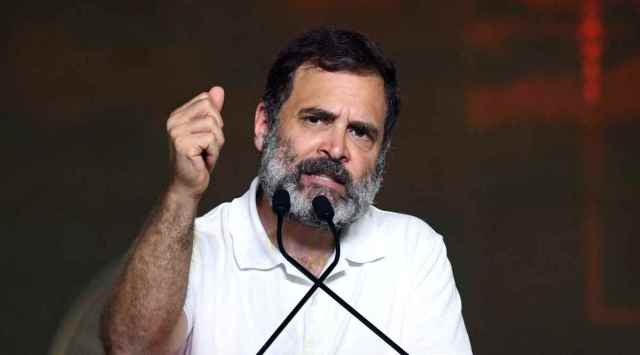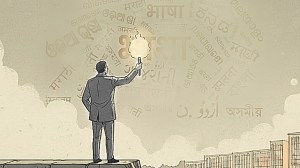Stay updated with the latest - Click here to follow us on Instagram
Gujarat HC declines to stay Rahul conviction: ‘Need of the hour is purity in politics’
A stay on the conviction by the High Court would have paved the way for Gandhi's reinstatement as a Lok Sabha MP.
 Congress leader Rahul Gandhi addresses a public meeting, in Khammam district, Sunday, July 2, 2023. (PTI Photo)
Congress leader Rahul Gandhi addresses a public meeting, in Khammam district, Sunday, July 2, 2023. (PTI Photo) The Gujarat High Court Friday declined to stay Congress leader Rahul Gandhi’s conviction in a criminal defamation case, making several observations including that “the offence committed by the accused falls in the category of moral turpitude” and that the “need of the hour” is to “have purity in politics”.
Stating that Gandhi was seeking a stay on his conviction “on absolutely non-existent grounds”, Justice Hemant Prachchhak upheld the April order of the Surat sessions court that declined to stay Gandhi’s conviction. In March, a Surat magisterial court had convicted and sentenced Gandhi to two years in prison.
On Friday, the High Court ruled that the sessions court order declining a stay on the conviction did not “call for any interference”.
Gandhi was found guilty of criminal defamation in a complaint filed by Surat West MLA Purnesh Modi of the BJP who objected to Gandhi’s remarks in Kolar in April 2019 — in the run-up to the Lok Sabha elections — about thieves with the Modi surname.
Following his conviction, Gandhi was disqualified from Lok Sabha where he represented the Wayanad constituency in Kerala.
In his order Friday, Justice Prachchhak said representatives of people should be men of “clear antecedent”.
“It also appears from the record that after filing of the said complaint, other complaints came to be filed against the present accused, out of which, one complaint was filed by the grandson of Veer Sawarkar in concerned Court of Puna when the accused used defamation utterances against Vir Sawarkar at Cambridge and another complaint was also filed in concerned Court of Lucknow. In the backdrop of the said circumstances, refusal to stay the conviction would not, in any way, result in injustice to the applicant.”
Rejecting Gandhi’s argument that defamation did not amount to a serious offence like murder, Justice Prachchhak said, “The present conviction is a serious matter, affecting a large segment of the society and needs to be viewed by this Court with the gravity and significance it commands… In the present case, in order to gauge the seriousness of the offence, another factor which compounds the case against the petitioner is that the defamation alleged was of a large identifiable class and not just an individual.”
“Due to the said fact, the conviction partakes the character of an offence affecting a large section of the public and by definition, the society at large and not just a case of an individual centric defamation case,” he said.
Underlining that “the petitioner is a senior leader of the oldest political party in India with a large presence and a prominent figure”, he said “every utterance of the petitioner automatically gets large-scale publicity.”
“In the modern electronic media environment, this large-scale publicity is lightning quick, difficult to contain and leaves a permanent imprint in the form of website links, videos, etc. The petitioner is assumed to be aware of the same and being a public personality is vested with the duty to exercise this vast power at his disposal with caution, ensuring that dignity and reputation of a large number of persons or any identifiable class is not jeopardised due to his political activities or utterances… It is crucial to note that the maximum punishment in any offence is not the only indicator of the seriousness of the offence,” he said.
Justice Prachchhak noted that Gandhi at the time was a MP, president of the second largest national political party and also president of the party which ruled the country for more than 50 years, and that he “made a false statement in the election with clear intention to affect the result of the election”.
“It appears that the accused suggested the name of the Hon’ble Prime Minister to add sensation, apparently and for an intention to affect the result of the election of the candidate of concerned constituency belonging to the political party of the Hon’ble Prime Minister and then the accused did not stop there but imputed that ‘saare choro ke naam Modi hi kyu hai’. Thus, the present case would certainly fall within the category of seriousness of the offence,” he said.
Stating that Gandhi’s statement qualified as one of moral turpitude, Justice Prachchhak said, “It appears that the accused is a Member of Parliament possessing high position in the society and having bounden duty not to scandalise any person from the society and the defence of fair comment is neither proved nor believed by the Courts below. The revisioner has breached modesty even if his version is accepted, and further revisioner owes a duty to each individual and the society in general not to influence the election on the basis of false fact. Thus, under the facts and circumstances of the case, the offence committed by the accused falls in the category of moral turpitude also.”







